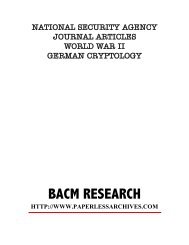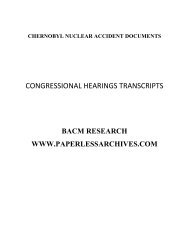Chernobyl Nuclear Power Plant CIA Files - Paperless Archives
Chernobyl Nuclear Power Plant CIA Files - Paperless Archives
Chernobyl Nuclear Power Plant CIA Files - Paperless Archives
You also want an ePaper? Increase the reach of your titles
YUMPU automatically turns print PDFs into web optimized ePapers that Google loves.
,it tet<br />
<strong>Chernobyl</strong>' has even been invoked by the Russian<br />
nationalist group Pamyat' as part of its anti-Semitic<br />
arsenal to "cleanse" Jewish influence from the Soviet<br />
Union. They blamed the accident on the Zionists.<br />
Such sentiments show Chernobyi's continuing potential<br />
to inflame ethnic and social tensions that hinder<br />
Gorbachev's efforts to unite public opinion behind his<br />
domestic reform program.<br />
Antinuclear Sentiment<br />
The accident has further raised public consciousness<br />
about environmental issues that have received prominent<br />
media attention under Gorbachev. Environmental<br />
concerns have contributed to a climate of public<br />
activism that could contest Moscow's plans for accelerated<br />
nuclear power expansion in the next decade.<br />
The Ukraine, for instance, is still scheduled to incr~<br />
the number of plants in the 1990s from fourone<br />
of which is <strong>Chernobyl</strong>'-to 10, each with multiple<br />
units. Many of these will be built n~r cities of a<br />
million or more, including Kiev, Khmelnitskiy, Kharkov,<br />
Odessa. Rovno, and Zaporozhye<br />
Concern among scientists about the impact of nuclear<br />
plants in the Ukraine existed even before <strong>Chernobyl</strong>'.<br />
A week before the accident, the president of the<br />
Ukrainian Academy of Sciences, BonsPaton,<br />
publicly called for II! review on siting and distribution<br />
of reactors in the republic and recommended the<br />
Ukrainian Academy of Sciences coordinate environmental<br />
protection programs in the republic. Since the<br />
accident. Paton has expressed his view that large<br />
industrial complexes should be held accountable for<br />
ecological disasters and th~t they should be required<br />
to maintain stringent safety measures ensuring<br />
"absolute reliability" of their technology.<br />
On the first anniversary of the <strong>Chernobyl</strong>' accident.<br />
Vitaliy Chumak, head of the Radiological Ecological<br />
Center at the Institute of <strong>Nuclear</strong> Research of the<br />
Ukrainian Academy of Sciences, criticized the Soviet<br />
nuclear industry in the English language weekly<br />
Moscow News for contiuuing to base their decisions<br />
on where to build nuclear plants mostly on logistical<br />
considerations--existing roads, labor resources, water<br />
resources-without fully considering public safety or<br />
the environment. Chumak's .rencern about siting several<br />
nuclear power stations dose together near heavily<br />
populated areas had been raised by Soviet scientists as<br />
early as 1979. In June 1987, the popular literary<br />
weekly Literaturnaya gazeta published an article by<br />
the Ukrainian poet Boris Oleynik, specifically blaming<br />
the planners and designers of <strong>Chernobyl</strong>' for not<br />
heeding the warnings of scientists and economists and<br />
siting the giant nuclear power plant on a river flowing<br />
into a major water supply reservoir and in a flood<br />
plain of the Poles'ye region. More recently, a Western<br />
press account reported that an unofficial club called<br />
Svetlitza was gathering signatures in Kiev protesting<br />
the presence of nuclear power plants in heavily popu~."<br />
lated areas. Another example was provided by! .",<br />
~ a petition, reportedly<br />
circulating in Moscow, calling for the shutting<br />
down the <strong>Chernobyl</strong>' nuclear plant. halting construction<br />
of other nuclear plants, and changing the<br />
policy of siting nuclear plants near large cities. Reportedly,<br />
the petitioners are particularly disturbed<br />
with the construction now in progress on the nuclear<br />
power plant in Crimea, a popular ·and widely used<br />
resort area.<br />
In the Caucasus, where the republic elites are not<br />
enthusiastic about nuclear energy, the <strong>Chernobyl</strong>'<br />
accident revived hopes among proponents of smallscale<br />
hydroelectric power plants (GES). Such plants<br />
powered the Soviet Union in the reconstruction years<br />
(1945-65), but in the last 15 years have been overshadowed<br />
by large thermal plants. According to recent<br />
press reports, Georgia, which has fought having a<br />
nuclear plant on its land, is also arguing strongly for<br />
more small-scale nydroelectric plants. These reports<br />
confirm the republic's commitment to pursue this<br />
option. This October, some 2,000 Armenians demonstrated<br />
in Yerevan for the closure of the nuclear<br />
power plant and a chemical factory that they say has -<br />
polluted the area for 40 years<br />
While Soviet citizens-in contrast to their counterparts<br />
ill the West-have not mounted a major protest<br />
against the development of nuclear power, antinuclear<br />
sentiment is growing as noted by the Armenian<br />
demonstration and the formation of the Svetliza<br />
group. <strong>Nuclear</strong> energy·has also become more of a<br />
public issue after the regime's attempts to minimize<br />
.J<br />
~cuel<br />
24
















